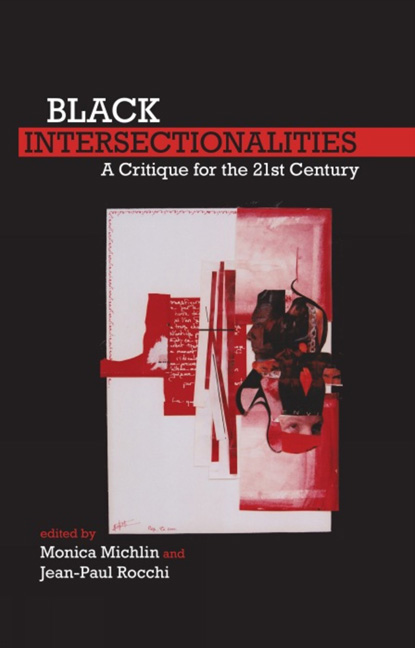Book contents
- Frontmatter
- Contents
- 1 Introduction: Theorizing for Change: Intersections, Transdisciplinarity, and Black Lived Experience
- 2 Exordium: Writing and the Relation: From Textual Coloniality to South African Black Consciousness
- I Challenging Hegemonic Gender Identities
- 3 Postcolonial Backlash and Being Proper: Femininity, Blackness, Sexuality, and Transgender in the Public Eye
- 4 Productive Investments: Masculinities and Economies in Fisher's The Walls of Jericho
- 5 “I Hugged Myself”: First-Person Narration as an Agential Act in Octavia Butler's “The Evening and the Morning and the Night”
- II Nonconformity and Narrative heorizing
- III Upsurges of Desire
- IV Epistemological Genealogies and Prospections
- Contributors
- Index
4 - Productive Investments: Masculinities and Economies in Fisher's The Walls of Jericho
from I - Challenging Hegemonic Gender Identities
- Frontmatter
- Contents
- 1 Introduction: Theorizing for Change: Intersections, Transdisciplinarity, and Black Lived Experience
- 2 Exordium: Writing and the Relation: From Textual Coloniality to South African Black Consciousness
- I Challenging Hegemonic Gender Identities
- 3 Postcolonial Backlash and Being Proper: Femininity, Blackness, Sexuality, and Transgender in the Public Eye
- 4 Productive Investments: Masculinities and Economies in Fisher's The Walls of Jericho
- 5 “I Hugged Myself”: First-Person Narration as an Agential Act in Octavia Butler's “The Evening and the Morning and the Night”
- II Nonconformity and Narrative heorizing
- III Upsurges of Desire
- IV Epistemological Genealogies and Prospections
- Contributors
- Index
Summary
Rudolph Fisher's 1928 novel The Walls of Jericho identifies “black states of desire” as economic, socio-political, and sexual, championing the transfer of financial means and the mobilization of erotic energies beyond lines of class, heteronormativity, and “race” in order to effect meaningful social change. Its project to break down the “walls” of the title – be they between black and white neighborhoods, different class positions in the African American community, or emotional repression mandated by hegemonic gender discourses – situates the text within modernist economies no longer governed by the imperative to save both money and corporeal capital but rather, as Michael Tratner has argued, by the injunction to spend:
Instead of slowly building up the self by laboring, saving, and restraining impulses, people were encouraged in the new credit economy to indulge economic desires by temporarily borrowing, as a way of keeping money circulating. Similarly, they were encouraged to indulge sexual desires […] to keep libido circulating. Not indulging in spending or sexuality would lead to a “pent-up” state that was considered deleterious to the economic or the individual body. (Tratner, 2001: 3)
Fisher's novel skillfully draws on such a modernist understanding of economics in which physical, sexual, and financial resources follow the same laws. Their trajectories determine the health of the human (implicitly male) body as much as the smooth functioning of industrial production and the financial system. Such a comprehensive notion of “economics” can fruitfully be analyzed by drawing on the writings of Pierre Bourdieu and his conceptualization of cultural skills, family connections, and other assets as forms of capital. In order to do greater justice to intersections of categories infrequently discussed by him, though, I will employ a revised version of Bourdieu's theory that incorporates “race,” gender, and sexuality as forms of social capital.
Even as the novel proposes the investment of financial capital in black homosocial joint ventures that transcend class divisions, and the judicious deployment of emotional and erotic energies to redefine hegemonic notions of gender and sexuality in productive ways, it emphasizes the necessity of moral boundaries for the passage of financial and emotional currents. It is the classic construction of homo oeconomicus, characterized by the relentless pursuit of personal gain without regard to the welfare of the group, that signals the limits of ethical investment in the narrative.
- Type
- Chapter
- Information
- Black IntersectionalitiesA Critique for the 21st Century, pp. 51 - 67Publisher: Liverpool University PressPrint publication year: 2013



